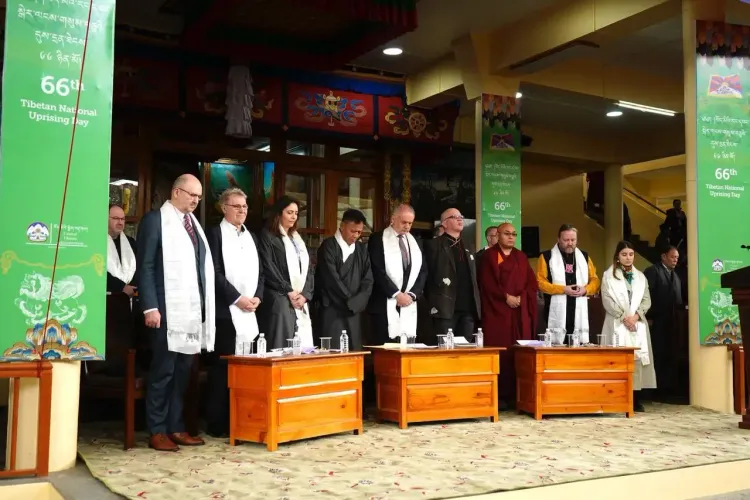Chinese Leadership’s Campaign Against Tibetan Identity: PM-in-exile Penpa Tsering

Synopsis
Key Takeaways
- Chinese leadership's strategy threatens Tibetan identity.
- Sinicisation policies lead to human rights violations.
- Over a million Tibetans lost their lives since 1959.
- Restrictions on religious freedom in monasteries.
- Commitment to non-violence and dialogue emphasized.
Dharamsala, March 10 (NationPress) Commemorating the 66th anniversary of the Tibetan National Uprising Day, with delegations from Slovakia and Estonia present, Prime Minister-in-exile Penpa Tsering stated on Monday that the current Chinese leadership is employing a calculated and perilous strategy to “eradicate the very identity of the Tibetan people as a distinctive human race”.
Speaking from Dharamsala, the seat of the Tibetan administration in exile, he remarked that under the guise of “enhancing the consciousness of Chinese national unity”, the Chinese government is enacting sweeping sinicisation policies that lead to the gradual extinction of Tibetan identity and the denial of basic human rights for the Tibetan populace, he stated.
More than a million Tibetans have lost their lives, forcing the legitimate Tibetan government, led by His Holiness the Dalai Lama, to flee, with around 80,000 Tibetans seeking refuge abroad.
“This signifies the darkest and most crucial chapter in Tibet's history. As we observe the Tibetan National Uprising Day, we pay tribute to our courageous martyrs and stand in solidarity with our brothers and sisters enduring the repressive Chinese regime,” he asserted.
Tibetan Uprising Day, celebrated on March 10, honors the 1959 Tibetan revolt against Chinese rule. The Dalai Lama has resided in India since escaping his homeland, with approximately 80,000 Tibetans fleeing to neighboring countries post-suppression of the uprising. Dialogue between the Dalai Lama’s representatives and Chinese officials collapsed in 2010 after nine rounds of discussions.
The democratically elected Prime Minister further noted that under the sinicisation initiative, extensive restrictions are enforced in monasteries, completely negating religious freedoms, while over a million young Tibetan children are forcibly placed in colonial-style boarding schools throughout Tibet.
Under the pretext of “promoting the national common language”, the teaching and usage of the Tibetan language face severe limitations, he remarked.
He also highlighted the unchecked mining and construction activities conducted by the Chinese government, which have caused irreversible harm to Tibet’s natural environment, with dire consequences extending beyond its borders.
“All these actions and policies by China violate not only international and national laws but also fundamental human values,” he asserted.
Reaffirming the pledge of non-violence, Prime Minister Tsering expressed: “As envisioned by His Holiness, the Tibetan people remain dedicated to a non-violent and dialogue-driven approach to achieving a lasting and mutually beneficial resolution to the Sino-Tibet Conflict through a middle-way strategy.”
“This also reinforces our belief that the Tibetan people, the rightful stewards of the Tibetan plateau since its inception, possess unique religious and cultural traditions that cannot be obliterated, an unwavering spirit that cannot be subdued, and an unmatched leadership of His Holiness the Dalai Lama that cannot be replicated,” he added.
Prior to attending the Central Tibetan Administration-organized Tibetan National Uprising Day, the visiting delegations from Slovakia and Estonia had an audience with the Dalai Lama at his residence.









